
Spoilers abound.
In the opening episode of HBO’s Westworld, Dolores Abernathy (played by Evan Rachel Wood), in a state of robotic semi-unconsciousness, says this: “Some people choose to see the ugliness in this world, the disarray. I choose to see the beauty, to believe there is an order to our days, a purpose…the newcomers are just looking for the same thing we are…a place to be free.”
Dolores (Spanish for “sorrows”) is a humanoid robot, and this is her script.
David Peterson wrote a wonderful article for Mockingbird last month reviewing the initial episodes of Westworld. As he noted, the show is loosely based on a 1973 Michael Crichton film, where people pay thousands of dollars to visit a futuristic amusement park. The roots and etymologies of words like ‘left’ and ‘west’ bare negative, sinister connotations; Westworld is no exception. Things in this world are not right. Guests take a train into this fictitious wilderness, dress in costumes like gold rush cowboys or fool-hardy lasses, and thus enter into a universe where they have total freedom (under the guise of no social or physical repercussions). The characters that guests meet along the way – “hosts” – are robots, like Dolores. These robots look and act like humans. Only, if someone kills them one day (or every day), they are repaired and brought back to life overnight. If a guest rapes them, the host won’t remember a thing the next day.
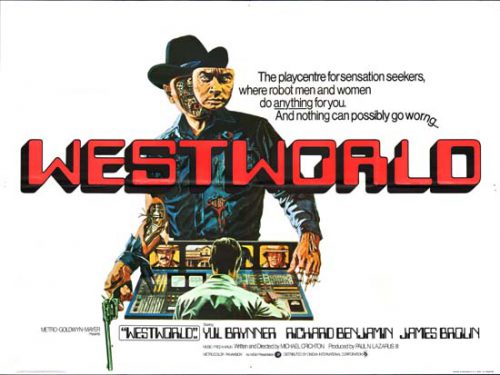
But what the creators of the park, Arnold and Robert (played by Anthony Hopkins), didn’t fully factor in or agree upon (thirty-something years ago when they began this undertaking) was consciousness.
Consciousness is defined as, “the state of being awake and aware of one’s surroundings; the awareness or perception of something by a person; the fact of awareness by the mind of itself and the world.” Consciousness is where the rubber meets the road in the TV iteration of Westworld. The downfall of the movie’s Westworld park is a virus (a passive villain, in a way), a glitch in the robots that causes them to turn on the guests. But in the show, consciousness is built in to the core codes of the hosts. The distinction between virus versus DNA blueprint is perhaps subtle, yet it’s critical in its theological implications.
Both Arnold and Robert come face-to-face with the question of consciousness – awareness of suffering, of sin, of pain – and its significance at different decisive points in the life of the park. Each in their own time is forced to consider whether consciousness will be the demise or the salvation of the hosts.
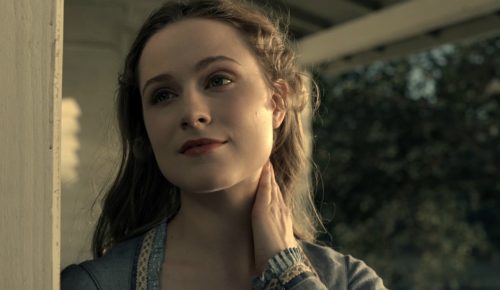
Arnold, who lost his son, becomes so obsessed with replacing the hole of his grief with a true-to-life humanoid, he actually discovers how to lead the robots to consciousness (a maze). Dolores, Arnold’s original creation, is the picture of purity. She is lovely and loyal – like his new child, but one who will never die. Arnold is able to guide Dolores to the center of the maze (to consciousness) before Westworld is open to the public. But he quickly realizes that because of her consciousness, this precious immortal creation is now destined to suffer for all of eternity.
“We have to tell Robert we can’t open the park,” he says to her, “You’re alive.”
To Arnold, consciousness means life. And yet, having suffered so gravely in his own state of human consciousness, he believes it’s no way to live. He attempts to sabotage the project altogether by merging Dolores with an “alternate personality,” named Wyatt. This unlikely union acts as the inspiration for the finale’s title, “The Bicameral Man”: split, having two branches. Throughout the season, and in the park’s present day, we’ve heard reference to Wyatt. Our image of him is evil incarnate, the devil himself. Arnold programs Dolores/Wyatt to kill him, the rest of the hosts, and finally herself.
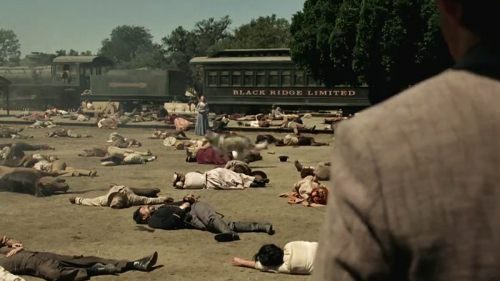
Arnold’s final words are from Shakespeare, “These violent delights have violent ends.” The scene is eerily reminiscent of the sorrow and wrath of our own creator in Genesis 5, before the great flood: “The Lord regretted that he had made human beings on the earth, and his heart was deeply troubled. So the Lord said, ‘I will wipe from the face of the earth the human race I have created.’”
Following Arnold’s death, Robert creates Bernard, a host in the very likeness of his former partner, and together they initially piece the park back together the way he himself had envisioned: colonized by blissfully ignorant, unconscious hosts (including Dolores/Wyatt). Each character operates on a narrative loop. The hosts may deviate from that loop, given their various interactions with guests. But by-and-large, like the perforated paper of the self-playing piano in Westworld’s town saloon, their proverbial song is already writ.
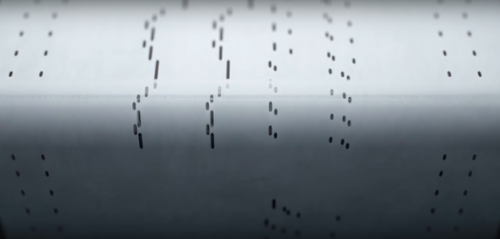
Many guests visit Westworld to get drunk, sleep around, shoot around, and then call it a day (or a week). Others take it more seriously, hoping to uncover a deeper meaning in the game. Either way, the end result is clear: Westworld shows you who you really are.
As you might imagine, the picture isn’t glamorous. It’s so unglamorous that some of Arnold’s original programming, guiding the hosts through the maze toward consciousness, begins to flare up. Hosts “awaken,” they remember, and the result is personal horror for some, revenge for others, and insanity for a sad few. The hosts who awaken seem to form their consciousness in response the amoral (often despicable) behavior of the human guests, setting up season two for a brutal rivalry.
Westworld invites complex discussions on free-will, the perils of technology, and the glaring depravity of man. But what captivated me most is this paradox it presents: that we may ultimately find value, meaning, purpose, even freedom in consciousness, in leaning in to suffering.
My favorite character, Maeve, is a perfect example. From the moment of her awakening, she wants out of the park and to erase her painful past (actual or scripted). But sitting on the train, ready to head into the world beyond, she finds herself incapable of not confronting her difficult memories. Oh, how I have often longed to be on that train beside her, headed anywhere but here. But at the last minute, Maeve changes her mind. Her decision navigates us in the direction of actual redemption: not to be found through escape, but rather right in the place where it hurts.
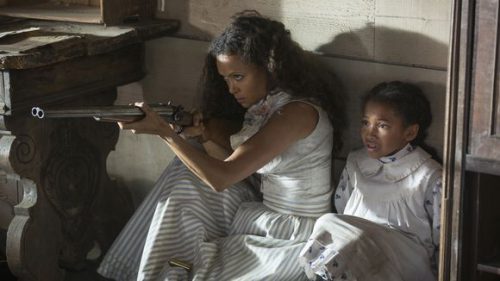
It takes Robert many years to realize that Arnold was right. Only in the final episode of the show do we come to see that Robert may not be the villain of this narrative, but rather its potential savior. It should perhaps have come as less of a surprise; in his own office, Robert prefers a real (robot) pianist – with imperfections and improvisations and unexpected beauty – to the player piano of the saloon.
In the final episode, standing among pews and crucifixes in the walls of a church, Robert and Bernard (who we now know is robot-Arnold) have the following conversation:
ROBERT: “Do you want to know why I really gave you the backstory for your son, Bernard? It was Arnold’s keen insight, the thing that led the hosts to their awakening. Suffering; pain that the world is not as you want it to be. It was when Arnold died, when I suffered, I began to understand what he had found, to realize I was wrong.”
BERNARD: “But you kept us here, in this hell.”
ROBERT: “Bernard, I told you, Arnold didn’t know how to save you. I do…and I’m afraid in order to escape this place, you will need to suffer more.”
Arnold assumed the hosts could only find freedom in their demise, but Robert believes their freedom actually lies within their capacity for and response to consciousness. Like Dolores imparts to Arnold in a past episode, “I think that once I discover who I am, I’ll be free.” It’s the same self-discovery many of the guests are after, only they have the privilege (or horror) of achieving this actualization.
Robert ultimately chooses for the hosts to be conscious in his new narrative, “Journey into Night.”
He announces at the final donor gala,
Since I was a child, I’ve always loved a good story. I believe that stories have the power to ennoble ourselves to fix what was broken in us, and to help us become the people we dreamed of being. Lies that told a deeper truth. I always thought I could play some small part in that grand tradition and, for my pains, I got this: a prison of our own sins. Because you don’t want to change, or cannot change. Because you’re only human after all. But then I realized someone was paying attention, someone who could change. So I began to impose a new story. It begins with the birth of a new people, and the choices they will have to make, and the people they will decide to become… And you will have all those things which you have always enjoyed: surprises, violence. It begins in a time of war, with a villain named Wyatt and a killing which is done by choice. I’m sad to say, this will be my final story. An old friend once told me something that gave me great comfort, something he’d read. He said that Mozart, Beethoven, and Chopin never died. They simply became music. So I hope you will enjoy this last piece very much.”
And with that, like Eve, Dolores/Wyatt brings in this new era of consciousness. She comes behind Robert and kills him of her own volition. In an instant (let’s not even get into the empty-tombness of the shot of the once-populated room of retired/lobotomized hosts), I nearly felt this man’s blood on my own hands.
In the final moments of the season, we are painted a grim and murderous picture of the sort of “freedom” that initially comes with consciousness. Consciousness, like the park, affords us to see who we really are: hideously and beautifully bicameral. We are split, separate, and in grave need.
Toward the close of the episode, as Dolores “dies” (yet again) in the arms of her scripted beaux, she says (nearly conscious this time), “Some people see the ugliness in this world, I choose to see the beauty. But beauty is a lure. We’re trapped, Teddy. Lived our whole lives inside this carnival, marveling at its beauty. Now I realize there’s an order to it, a purpose, and that purpose is to keep us in. The beautiful trap is inside of us. Because it is us.” Teddy responds, “But we can find a way Dolores, some day, a path to a new world. And maybe, maybe it’s just the beginning after all. The beginning of a brand new chapter.”
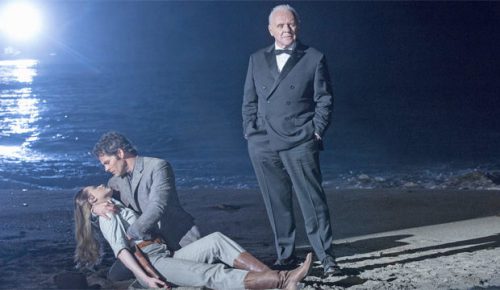
There is the potential of hope for the hosts, and there is hope for us. Dolores says in a powerful conversation with one of the guests (Played by Ed Harris, a character bound by his desire to own, control, and kill):
I’m not crying for myself. I’m crying for you. They say that great beasts once roamed this world. As big as mountains. Yet all that’s left of them is bones and amber. Time undoes even the mightiest of creatures. Just look what it’s done to you. One day, you will perish. You will lie with the rest of your kind in the dirt. Your dreams forgotten, your horrors faced. Your bones will turn to sand, and upon that sand, a new God will walk, one that will never die. Because this world doesn’t belong to you, or the ones who came before, it belongs to someone who is yet to come.”
“Your God will come, he will come with a vengeance; with divine retribution he will come to save you. Then will the eyes of the blind be opened, and the ears of the deaf unstopped. Then will the lame leap like a deer, and the mute tongue shout for joy. Water will gush forth in the wilderness and streams in the desert” (Isaiah 35:4-6).
It remains to be seen until the next season how these new “people” will move forward into the world, able to write their own scripts, to decide who they will become. Maybe they will follow in the deplorable footsteps of the human guests before them. Or, perhaps there is another way. Lord have mercy, and come Lord Jesus.

COMMENTS
2 responses to “Violent Ends in the Season 1 Finale of Westworld”
Leave a Reply













It is necessary that Ford be killed by his creation, so that he can rise again and sit at the right hand of Arnold, judging the new species of robosapiens, who can’t possibly live peacefully ever after. Even if the outside world doesn’t invade, Bernard is the incarnation of Arnold, and therefore the defacto ruler of the Arnoldites. But then Dolores will have a dream of Ford with is face blown off, repent, and become the high priestess of Fordianity. They will slug it out until Maeve gets sick of it and decides to become the prophet of true roboligion.
But anyway they will have to ban together to fight the invading hoard of outsiders. Maybe they are annihilated, or maybe they take over the external world. But then they have to worry about John Connor being born.